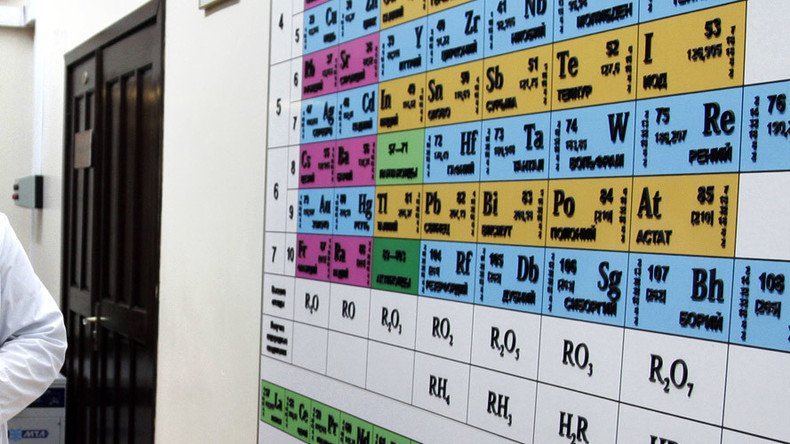4 brand new elements discovered by Russian, Japanese & US researchers

Russian, American and Japanese scientists are behind the addition of four new elements to the periodic table, altering textbooks yet again. The seventh row in the table is now complete, making this the first addition since 2011, when two elements were added.
The discovery and addition were announced by the Union of Pure and Applied Chemistry on December 30, and relates to elements 113, 115, 117 and 118. The teams belonged to Russia’s Joint Institute for Nuclear Research in Dubna, the Lawrence Livermore National Laboratory in California and the Riken Institute in Japan.
The new elements are all synthetic, and were arrived at by smashing very light nuclei into each other and tracking the elements that potentially appear in the decay tails. The issue with elements at the end of the periodic table stems from their very faint stability.
But the researchers say the continuing search for new elements has been reinvigorated, because we are beginning to scratch the surface of superheavy elements that are also stable. With 113, which Japan’s Kosuke Morita researched, the decay time was infinitesimally small, but he says the time and effort are worth it, as we attempt to understand the structure of atomic nuclei.
Morita added in the statement that his team will go on to “look to the uncharted territory of element 119 and beyond.” Risen’s president Ryoji Noyorei told The Guardian that Morita’s discovery is to scientists “of greater value than an Olympic gold medal.”
The elements will all receive names in the coming months, but Morita’s 113 is set to become the first to be named in Asia.
“IUPAC has now initiated the process of formalizing names and symbols for these elements temporarily named as ununtrium, (Uut or element 113), ununpentium (Uup, element 115), ununseptium (Uus, element 117), and ununoctium (Uuo, element 118),” said Professor Jan Reedijk, president of the Inorganic Chemistry Division of IUPAC.













